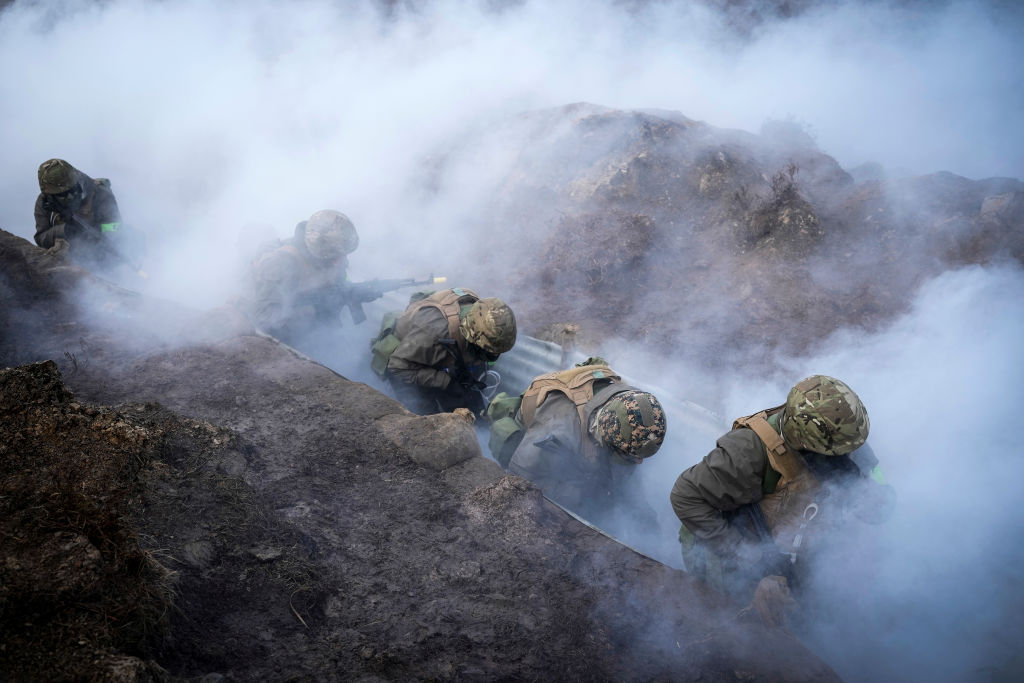Sir Keir Starmer’s proposal to put British troops on the ground as part of a peacekeeping force in Ukraine is a principled and politically bold move. But the sad reality is that Britain is in no position to act as Ukraine’s peacekeeper. Starmer is playing with an empty deck and singing from obsolete songbook.
Starmer has few options left other than gesture politics
Starmer’s offer to put British troops on the ground is, in practical military terms, a very small promise. As former British Army chief Lord Dannatt pointed out last night, the UK’s armed forces are ‘so run down’ that we could not lead any future peacekeeping mission in Ukraine. Ukraine’s President Volodymir Zelensky has estimated that a peacekeeping force of 200,000 foreign troops would be needed to police a 1,250 kilometre long line of contact. But the entire deployable force that Britain has is a mere 56,000 – compared to 1.1 million Ukrainians currently under arms. Realistically, estimates Michael Kofman of the Carnegie Endowment for International Peace, the whole of Europe can come up with just three brigades, or less than 15,000 troops deployed at any one time. But the bigger question is ‘what should this force do, and how does it deter?’ asks Kofman. ‘If it is a tripwire, what does it attach to?… What is this force backed by, and what happens if it is attacked?’ Without American backing, a European force would have limited credibility as a deterrent.
Inexplicably, and unhelpfully, Sir Keir also continues to insist that Ukraine is on an ‘irreversible’ path to Nato membership – though it’s becoming increasingly clear that Nato membership for Kyiv is dead in the water. Ukraine’s joining the alliance has been ‘the reddest of red lines’ for the Kremlin since before Putin took power, according to former CIA director (and US Ambassador to Moscow) William Burns. Kyiv’s own negotiators were willing to concede that Ukraine should remain neutral during the aborted talks in the aftermath of Putin’s invasion in March 2022. Yet despite the fact that the new Trump administration has signalled decisively that Nato membership for Kyiv is decisively obsolete, Starmer continues to stick to Europe’s now-defunct party line.
France’s Emmanuel Macron has summoned European leaders – plus Starmer – to Paris to discuss their response to Donald Trump’s plans to negotiate directly with Putin. But Europe on its own doesn’t have the economic resources to bankroll Zelensky’s war-effort beyond this year. Nor does it have the political resources to block any proposed peace deal that Trump brokers with Putin. Most crucially, Europe lacks the military and military-industrial resources either to step in to defend Ukraine against Russia or to keep Ukraine supplied with the weaponry it needs. And despite Starmer’s offer of UK troops there is little sign that European electorates are ready for direct involvement in Ukraine.
‘The tragedy of Europe’s position vis-a-vis Ukraine is, as things stand, Europeans are not willing to die for Ukraine,’ says Sergey Radchenko of Johns Hopkins University. ‘They are not willing to die, they are not willing to send their children there to die. Not in the uncertain future, but now, at this time.’
Then there is the question of whether, and how, Putin could ever be compelled to accept a peacekeeping force made up of Nato troops. Preventing Nato boots on the ground in Ukraine is the single most fundamental reason that Putin launched his invasion of Ukraine in 2022. There is only one way that the Kremlin could accept such a deal and that’s by being compelled by overwhelming force to do so. Instead, Putin’s forces continue to advance steadily in Donbas – and hopes of an imminent collapse of the Russian economy, or of support for the war in Russia, are still distant prospects. Kremlin spokesman Dmitry Peskov quickly poured cold water on suggestions of a European peacekeeping contingent. ‘These are Nato member countries,’ said Peskov. ‘Consequently, Nato troops would be stationed on the territory of Ukraine. Therefore, this is a very complex issue.’
There was a time when the UK’s intervention in the Ukraine conflict was a true moral – if not practical – game-changer. Boris Johnson led the charge in April 2022 with assurances of military help for as long as it took for Ukraine to win, and shamed both Brussels and Washington into massively upgrading their initially lukewarm support. There’s no doubt that made a huge difference – though the UK’s actual financial contribution was a drop in the bucket compared to Washington’s.
Now, three years on, Starmer has few options left other than gesture politics. Sending UK troops is an offer he can make in the knowledge that the chances Putin will ever accept such a deployment are slim to none.
However, there is one major shift in Starmer’s policy, and it’s a welcome one. Until very recently the UK government – which unlike the rest of the West has seen unanimous cross-party support for arming Ukraine – repeated the mantra that we would support Ukraine until victory, for ‘as long as it takes’. It’s been clear for a while now, as the front lines froze and US support waned, that this assurance was an empty one. Yet many Western politicians – including our own – continued to signal their virtue by writing verbal cheques to be paid in the blood of young Ukrainians.
Starmer has now acknowledged that the war is likely to end soon, and will end with a partitioned border that may need international peacekeepers. That’s a major shift – some would say capitulation to the new Trumpian reality – that Starmer has cleverly covered with the sensational possibility of British lads patrolling in Donbas.








Comments